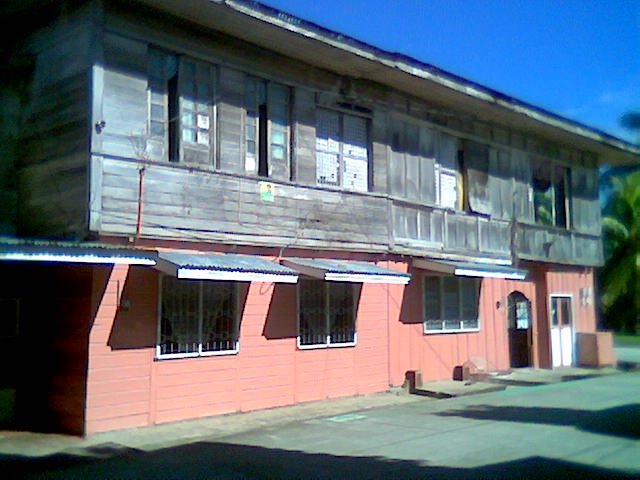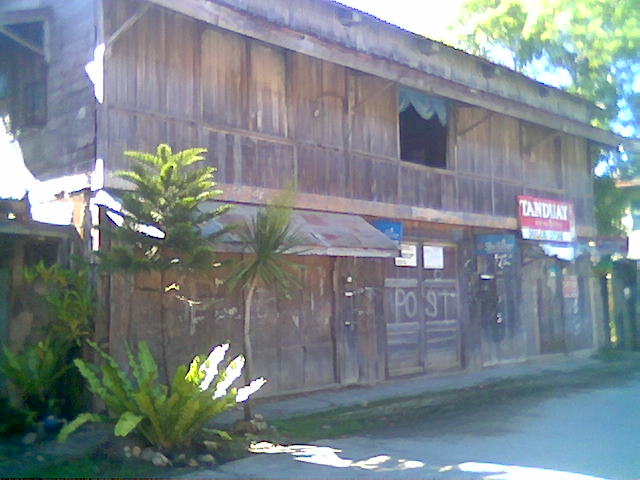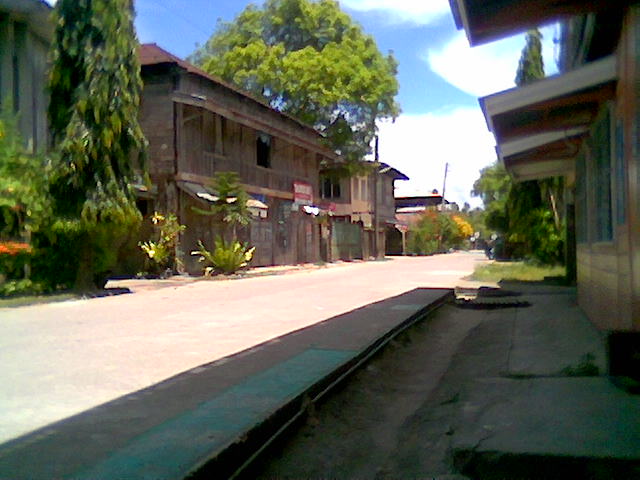 One of the things that a visitor notices immediately when setting foot in Lianga for the first time is the fact that the town is dotted by many old houses and residences, some of them dating back to the early years of the last century.
One of the things that a visitor notices immediately when setting foot in Lianga for the first time is the fact that the town is dotted by many old houses and residences, some of them dating back to the early years of the last century.None of them, of course, are in any way similar to the stately, palatial and well preserved, Spanish-inspired mansions of many Philippine towns that were already flourishing during the Spanish colonial period. Instead, the ones in Lianga are large, squat and box-like structures of weathered wood, almost always two stories high and having huge open windows with sliding panels of wood and glass. Most of these houses now sport corrugated, sheet metal roofs but decades ago nipa was the roofing material of choice.
Entrances to the two floors of the typical house are usually separate since two more more families live in it. An imposing staircase, often accessible from the outside, provides access to the upper level which typically is the main residence and which usually has a huge living room ventilated and lighted by gaping, open windows that overlook highly polished, dark colored, wooden floors and heavy, imposing and uncomfortable-looking, antique furniture.
If there is a feudal aristocracy in Lianga (some say there was and there is still indeed one) then these old houses are the castles and palaces. And from within their wood walls the questions involving the political, social and economic life of the town were discussed and decided upon by those who considered themselves its resident movers and shakers.
A lot of Lianga's history is etched and written upon the walls and pillars of these houses and, in many ways, they are witnesses and guardians of of its checkered past. The weathering and patina of age that cling to these structures speak of the relentless march of time and how, from one perspective, the structures that man builds often outlives him and acquire a presence and existence separate from the person or persons who created them.
Inside their walls I am humbled by the weight of the ages past and I am aware of a feeling of awe, a reverence for the memories, impressions and echoes of the past. The ghosts of the lives lived within seem to flit to and fro, from room to room, never malignant and somehow benign yet vaguely reeking sometimes of sorrow, despair and regret probably for lost opportunities and unfulfilled dreams. A lot of melancholy there or was it just my own feelings and thoughts they were simply feeding on?
What is true is that Lianga is an old town. In the beginning of the last century while the other surrounding municipalities were either none existent or just mere hamlets, it was already a bustling trading center. It was also a transportation hub for those who had to travel by sea to the other coastal communities in the immediate area since there were still no roads connecting the towns and settlements.
The construction of these big houses at around that time was a measure of the then relative importance of the town as a population center and a magnet for trade and commerce. Over the years, particularly in the decades following the Second World War, the town grew and flourished. Lumber from the area's virgin forests became a major source of income and the revenues made Lianga relatively rich and its people complacent.
The bubble finally burst in the 1980's and 90's after years of economic decline. Peace and order problems brought about by general lawlessness and a rapidly growing Communist insurgency merely aggravated the situation and the town has since then stagnated and became moribund.
But it could and would not die. Like an aged yet stubborn crone recovering from a supposedly terminal illness and refusing to give in to the disease, it clings desperately to life and draws strength and the will to continue from the memories of a glorious past and the desperate hope for a better future.
 The old houses best symbolize this obstinate refusal to surrender. Year after year, decade after decade, they still stand, worn out and tired but still gamely standing, no longer pretty and showing plainly to the naked eye the rigors and scars of the hard years that have come and have stayed. And seemingly waiting for the day when they can be again witnesses to momentous events, history unfolding and the chance to relive the glories of the past in the face of an unknown, uncertain future.
The old houses best symbolize this obstinate refusal to surrender. Year after year, decade after decade, they still stand, worn out and tired but still gamely standing, no longer pretty and showing plainly to the naked eye the rigors and scars of the hard years that have come and have stayed. And seemingly waiting for the day when they can be again witnesses to momentous events, history unfolding and the chance to relive the glories of the past in the face of an unknown, uncertain future.The soul of Lianga is very much alive in these structures and for that reason alone I am partial to them. I wish they would always be there to stay. They may be weakened and battered by time as well as becoming drab, dull and spiritless. Yet they remain defiant, obstinately stubborn and continually defying all odds.












